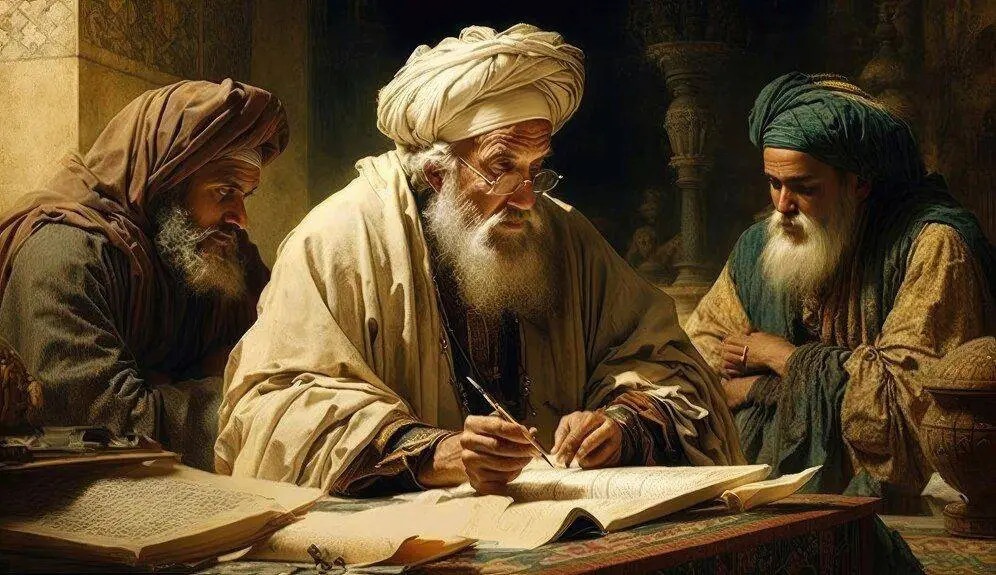The Legacy of Islamic Scholars: Guardians of Knowledge and Enlightenment
Discover The Legacy of Islamic Scholars and the invaluable contributions of scholars who have been guardians of knowledge and beacons of enlightenment throughout history. Explore their profound impact on science, philosophy, literature, and spirituality, shaping the course of human civilization.
Introduction:
The legacy of Islamic scholars shines brightly as a beacon of knowledge and enlightenment that has illuminated the path of humanity for centuries. From the golden age of Islamic civilization to the present day, these visionary thinkers, scientists, and philosophers have dedicated their lives to the pursuit of knowledge and the advancement of learning in diverse fields. Join us on an emotional journey as we explore the profound contributions and enduring legacy of Islamic scholars, whose wisdom continues to inspire and enlighten generations.

The Legacy of Islamic Scholars: Guardians of Knowledge and Enlightenment
The Golden Age of Islamic Civilization
Revival of Learning:
The golden age of Islamic civilization, spanning from the 8th to the 14th centuries, was characterized by a flourishing of knowledge and culture. Islamic scholars played a pivotal role in preserving and translating ancient Greek, Persian, and Indian texts, laying the foundation for advancements in science, philosophy, and literature.
Centers of Learning:
Cities such as Baghdad, Cairo, and Cordoba emerged as vibrant centers of learning, where scholars from diverse backgrounds and disciplines congregated to exchange ideas, debate philosophical concepts, and engage in scientific inquiry. These intellectual hubs fostered an atmosphere of creativity, innovation, and collaboration that propelled Islamic civilization to new heights of achievement.
The House of Wisdom:
The House of Wisdom in Baghdad served as a prestigious institution of learning during the Abbasid Caliphate, attracting scholars from across the Islamic world and beyond. It was a hub of intellectual activity, where manuscripts were translated, scientific experiments conducted, and philosophical debates held, contributing to the advancement of knowledge in fields ranging from astronomy and mathematics to medicine and philosophy.

Contributions to Science and Medicine
Pioneering Discoveries:
Islamic scholars made pioneering discoveries and breakthroughs in various branches of science, including astronomy, mathematics, and medicine. From the astronomical observations of Al-Battani to the medical treatises of Ibn Sina (Avicenna), their contributions laid the groundwork for future scientific advancements and shaped our understanding of the natural world.
Advancements in Mathematics:
Islamic mathematicians made significant advancements in algebra, trigonometry, and geometry, introducing innovative concepts and techniques that revolutionized the field. Figures such as Al-Khwarizmi and Omar Khayyam played key roles in the development of algebra and the refinement of mathematical principles that are still used today.
Medical Treatises and Innovations:
Islamic physicians and scholars produced comprehensive medical treatises and manuals that became standard references in the study and practice of medicine. The works of Ibn Sina, Al-Razi (Rhazes), and Ibn al-Nafis provided valuable insights into anatomy, pharmacology, and disease prevention, laying the groundwork for modern medical science.

Philosophy, Literature, and Spirituality
Philosophical Inquiry:
Islamic scholars engaged in profound philosophical inquiry, exploring questions of existence, morality, and the nature of reality. Figures such as Al-Farabi, Ibn Rushd (Averroes), and Ibn Arabi delved into metaphysics, ethics, and theology, shaping the development of Islamic philosophy and influencing philosophical thought in the Western world.
Literary Masterpieces:
Islamic literature flourished during the golden age of Islamic civilization, producing literary masterpieces that captivated the imagination and inspired generations. Works such as “The Thousand and One Nights,” by scholars such as Ibn Tufail and Ibn al-Nafis, showcased the rich tapestry of storytelling, poetry, and prose that characterized Islamic literary tradition.
Spiritual Wisdom:
Islamic scholars also contributed to the spiritual and mystical dimensions of Islam, exploring themes of inner contemplation, devotion, and enlightenment. Sufi mystics such as Rumi, Ibn Arabi, and Al-Ghazali imparted profound spiritual wisdom through their writings and teachings, guiding seekers on the path of self-discovery and divine union.

Frequently Asked Questions (FAQs):
How did Islamic scholars contribute to the preservation of ancient knowledge?
Islamic scholars played a crucial role in preserving and translating ancient Greek, Persian, and Indian texts during the golden age of Islamic civilization. By translating these manuscripts into Arabic and building vast libraries, they ensured that knowledge from antiquity was accessible to future generations.
What were some notable scientific achievements of Islamic scholars?
Islamic scholars made significant contributions to various branches of science, including astronomy, mathematics, and medicine. Their achievements include advancements in trigonometry, the development of algebra, and the discovery of new medical treatments and surgical techniques.
How did Islamic philosophy influence Western thought?
Islamic philosophers such as Al-Farabi, Ibn Rushd, and Ibn Arabi had a profound impact on Western thought, particularly during the Middle Ages. Their works were translated into Latin and served as a bridge between Greek philosophy and the European Renaissance, shaping the development of Western philosophical thought.
What role did Sufi mystics play in Islamic spirituality?
Sufi mystics, also known as Sufis, played a central role in Islamic spirituality, emphasizing the inner dimensions of faith and the pursuit of divine love and knowledge. Through practices such as meditation, chanting, and ecstatic dance, Sufis sought to attain spiritual enlightenment and union with the Divine.
How did Islamic scholars contribute to the development of literature?
Islamic scholars made significant contributions to literature through their writing and patronage of the arts. They produced literary masterpieces in various genres, including poetry, prose, and storytelling, that reflected the cultural richness and diversity of the Islamic world.
What impact did the House of Wisdom have on intellectual life in Baghdad?
The House of Wisdom in Baghdad served as a vibrant center of learning and intellectual exchange during the Abbasid Caliphate. Scholars from diverse backgrounds congregated there to translate ancient manuscripts, conduct scientific experiments, and engage in philosophical discourse, contributing to the advancement of knowledge in multiple fields.
How did Islamic scholars advance the field of medicine?
Islamic scholars made significant advancements in the field of medicine through their research, experimentation, and clinical practice. They developed new surgical techniques, pharmacological treatments, and diagnostic methods that laid the foundation for modern medical science.
What were some notable literary works produced by Islamic scholars?
Islamic scholars produced a wealth of literary works in various genres, including poetry, fiction, and philosophy. Notable examples include “The Canon of Medicine” by Ibn Sina, “The Rubaiyat” by Omar Khayyam, and “The Conference of the Birds” by Attar of Nishapur.
How did Islamic scholars contribute to the development of architecture?
Islamic scholars made significant contributions to the field of architecture through their designs, innovations, and patronage of the arts. They created iconic buildings such as mosques, palaces, and madrasas that reflected the cultural, spiritual, and aesthetic values of Islamic civilization.
What is the enduring legacy of Islamic scholars?
The enduring legacy of Islamic scholars lies in their profound contributions to knowledge, culture, and spirituality. Their achievements continue to inspire and enlighten people around the world, reminding us of the timeless pursuit of wisdom and the transformative power of human creativity.
Conclusion:
The legacy of Islamic scholars stands as a testament to the enduring power of knowledge, enlightenment, and human creativity. From the scientific discoveries of Al-Battani to the mystical insights of Rumi, their contributions have enriched our understanding of the world and inspired generations to seek truth, wisdom, and beauty. Let us honor and celebrate the legacy of Islamic scholars, whose enduring wisdom continues to illuminate the path of humanity towards a brighter future.







